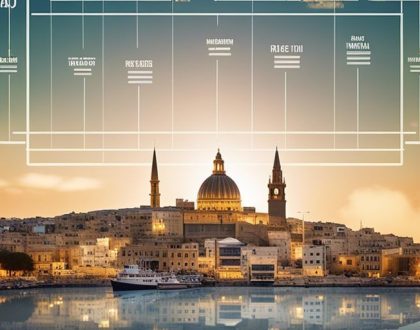10 Insights Into Malta's Legal System

Mixed Legal Tradition
Civil law foundation
Now, let’s investigate into Malta’s legal system, which boasts a unique mix of civil law and common law influences. The civil law foundation in Malta traces back to its time as a French territory in the early 19th century. This foundation is characterized by comprehensive legal codes that outline rights, duties, and procedures.
British influence
Mixed with the civil law tradition is the significant British influence on Malta’s legal system. Malta was a British colony for over 150 years, from 1814 to 1964, which left a lasting impact on its legal framework. The British influence introduced common law principles and practices that continue to coexist alongside civil law in Malta’s legal landscape.
It is important to note that while civil law forms the basis of Malta’s legal system, the British influence has contributed to the richness and complexity of its legal heritage. This fusion of legal traditions has shaped Malta’s unique approach to jurisprudence and legal reasoning, making it a fascinating subject for legal scholars and practitioners alike.
Comprehensive Constitution
Fundamental rights
To ensure a just and fair society, Malta’s constitution includes protections for fundamental rights. Assuming a vital role in safeguarding the rights of its citizens, the constitution guarantees freedoms such as the right to life, liberty, and property. These rights are necessary in upholding the dignity and autonomy of individuals within Maltese society.
Separation of powers
Fundamental to the functioning of Malta’s legal system is the principle of separation of powers. This doctrine ensures that the executive, legislative, and judicial branches operate independently of each other, preventing any single branch from abusing its authority. This division of powers promotes accountability and prevents concentration of power in the hands of a few.
The separation of powers in Malta’s legal system is necessary in maintaining a system of checks and balances, where each branch of government can limit the powers of the others. This safeguards against tyranny and ensures that decisions are made democratically.
Supreme Court Authority
Final appellate jurisdiction
One of the key roles of the Supreme Court in Malta is its final appellate jurisdiction. This means that the Supreme Court has the ultimate authority to make decisions on appeals from lower courts, ensuring that the law is applied correctly and consistently throughout the country.
Legal precedent
Final decisions made by the Supreme Court in Malta set legal precedent that lower courts must follow in similar cases. This helps to ensure consistency in the application of the law and promotes predictability in legal outcomes. Legal precedent plays a crucial role in shaping the legal landscape of Malta and guides future court decisions.
This adherence to legal precedent not only enhances the fairness and transparency of the legal system but also contributes to the overall stability and credibility of the judiciary in Malta.
Legal Code Evolution
Napoleon's Influence
Keep in mind that Malta’s legal system has been influenced by various sources throughout its history. One major influence came from Napoleon Bonaparte’s Code Napoléon, also known as the Napoleonic Code. This French civil code, introduced in Malta during the French occupation in the early 19th century, had a lasting impact on the development of Maltese laws.
Ongoing Amendments
With the passage of time, the Maltese legal system has undergone numerous amendments to adapt to the changing needs of society. These ongoing amendments ensure that the legal code remains relevant and effective in addressing contemporary issues. For instance, the Maltese government regularly reviews and updates laws related to areas such as technology, environment, and human rights.
These updates help to enhance the protection of citizens’ rights, promote social justice, and address emerging challenges.
Judicial Appointments
Presidential discretion
For judicial appointments in Malta, the President plays a crucial role in the process. While the Constitution provides guidelines on appointment procedures, the President ultimately has discretionary powers to appoint judges to the bench.
Judicial independence
Any discussion about Malta’s legal system would be incomplete without highlighting the importance of judicial independence. This principle ensures that judges are free from external influences and can make decisions solely based on the law and evidence presented in court.
A key factor in maintaining judicial independence in Malta is the security of tenure enjoyed by judges. This means that once appointed, judges can only be removed through a specific procedure outlined in the Constitution, safeguarding them from arbitrary dismissal due to political pressure or interference.
Legal Profession
Advocates and Notaries
After completing their education and practical training, individuals in Malta can become either advocates or notaries. Advocates are legal professionals who can represent clients in court and give legal advice, while notaries handle non-contentious legal matters such as property transfers and wills. Both professions play crucial roles in the Maltese legal system.
Warrant requirement
If you want to practice as an advocate or notary in Malta, you must obtain a warrant from the Chamber of Advocates or the Notarial Council, respectively. These warrants signify that the individual has met the necessary qualifications and standards set by the legal profession in Malta.
The process of obtaining a warrant in Malta is rigorous. Not only does it require a law degree and practical training, but individuals must also pass specific exams and meet professional conduct standards. Having a warrant ensures that advocates and notaries adhere to high ethical and professional standards when representing clients and handling legal matters.
Notaries play a crucial role in certifying legal documents and transactions, ensuring their validity and authenticity. They provide an crucial service in facilitating various legal processes and transactions in Malta.
Criminal Law
Penal code reliance
All criminal offenses in Malta are governed by the Penal Code, which serves as the primary legal source for defining crimes and their corresponding penalties. Malta’s Penal Code covers a wide range of offenses, from theft and assault to more serious crimes like drug trafficking and murder. This reliance on a comprehensive legal framework ensures consistency and clarity in criminal proceedings.
Due process focus
Criminal proceedings in Malta place a strong emphasis on due process, ensuring that individuals accused of crimes are given a fair and transparent trial. The Maltese legal system guarantees the right to legal representation, the presumption of innocence until proven guilty, and the opportunity to present evidence in one’s defense. This focus on due process safeguards the rights of both the accused and the victims, promoting fairness and justice in the legal system.
Civil Law
Codified statutes
Many legal systems around the world are divided into two main branches: civil law and common law. Malta follows a civil law system, which is influenced by the Napoleonic Code due to its historical ties with France. There’s a strong emphasis on codified statutes in Malta’s legal framework, with laws clearly written and organized into codes.
Private law matters
Many aspects of individuals’ interactions and relationships fall under private law matters in Malta’s legal system. Matters such as contracts, property, and family law are governed by private law principles. Private law regulates the relationships between individuals, providing a framework for resolving disputes and enforcing rights.
Private law matters can involve various legal intricacies, and it is crucial for individuals to seek legal guidance when dealing with such issues. Whether it’s drafting a contract, resolving a property dispute, or navigating family law matters, private law plays a crucial role in governing personal relationships and ensuring legal rights are protected.
Commercial Law
Pro-business approach
Now, let’s research into the commercial law landscape in Malta. Known for its pro-business approach, Malta offers a welcoming environment for entrepreneurs and investors alike. The country’s legal system is designed to support and encourage business growth, making it an attractive location for setting up a company or expanding operations.
EU regulations compliance
The Maltese legal system places a strong emphasis on EU regulations compliance, ensuring that businesses operating in Malta adhere to the highest standards set by the European Union. One of the key advantages of conducting business in Malta is the country’s commitment to aligning its laws with EU directives, providing businesses with a solid legal framework that promotes transparency and fairness.
This commitment to EU regulations compliance not only enhances Malta’s reputation as a reliable and trustworthy business hub but also ensures that businesses can operate with confidence in a secure and regulated environment. Adhering to EU standards also opens up opportunities for businesses to expand their reach within the European market seamlessly.
Human Rights
European Court adherence
With Malta being a member of the Council of Europe, it is bound by the European Convention on Human Rights (ECHR) and acknowledges the jurisdiction of the European Court of Human Rights in Strasbourg. This means that individuals in Malta can bring complaints of human rights violations to the European Court if they feel their rights have been infringed upon.
Local enforcement mechanisms
With regards to local enforcement mechanisms, Malta has a Human Rights and Integration Directorate within the Ministry for Social Dialogue, Consumer Affairs, and Civil Liberties that works to promote and protect human rights within the country. This Directorate is responsible for investigating complaints of human rights violations, raising awareness about human rights issues, and promoting equality and non-discrimination.
This ensures that there are local mechanisms in place to address human rights concerns within Malta itself, granting individuals the opportunity to seek redress and protection at a national level. These local enforcement mechanisms play a crucial role in upholding human rights standards and values within Malta’s legal system.
Recommended Posts

Legal Insights Malta’s Gaming Regulations
April 26, 2024

The Grandmasters of Malta
April 26, 2024

Malta's Finance Sector – A Deep Dive
April 26, 2024
